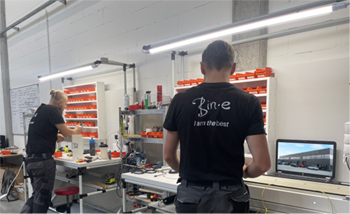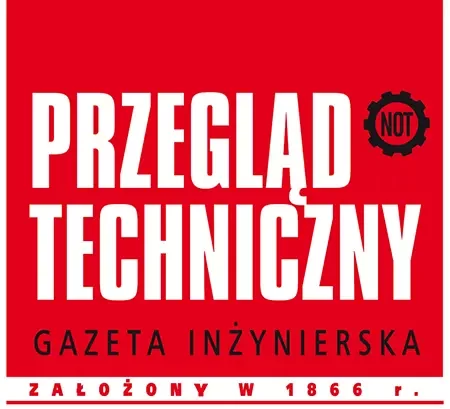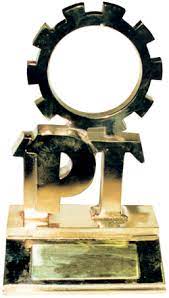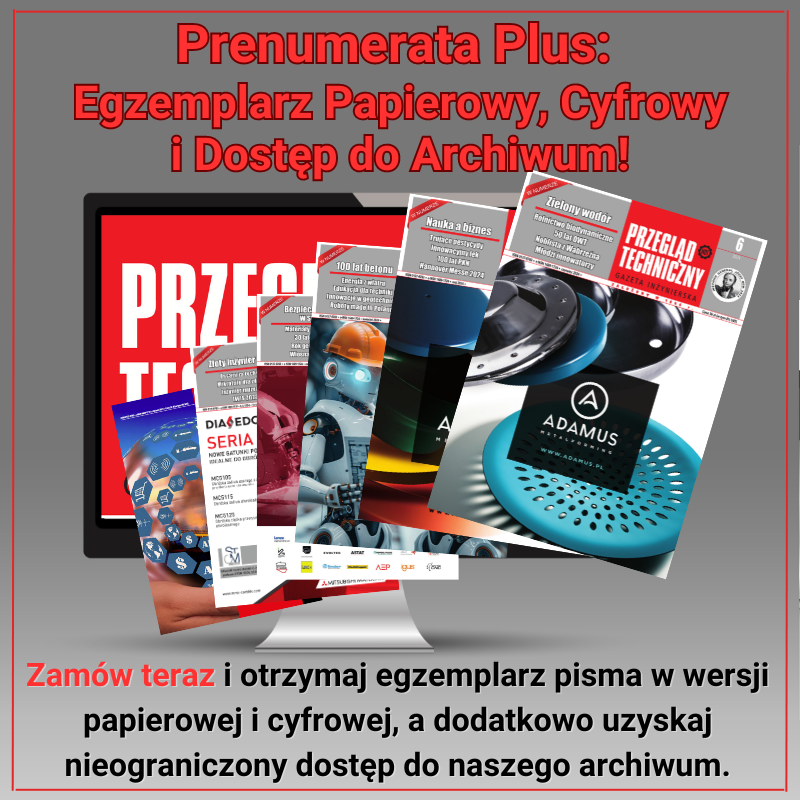Although we realize how important it is to segregate trash to protect the environment from further degradation, we don’t always know how to sort it properly. The Polish company Bine has created a smart garbage can, which – thanks to the technology used – will do it for us. The founders of the company, Jakub Luboński and Marcin Łotysz, tell “Przegląd Techniczny” about how the “smartest garbage can in the world” works and about development plans, in an interview with Lidia Sosnowska.
– A smart trashcan – this sounds like information from a science fiction movie.
– Marcin Latosz: Today’s science fiction films show technological solutions that are much more forward-looking. Meanwhile, our product is a kind of robot that recognizes and sorts waste. Practice shows that this is a must if we want to obtain clean and recyclable raw material streams for further processing.
– Where did the idea for such a product come from?
– Jakub Luboński: It was prompted by life. We used to run a software-house and one day decided to segregate our office waste. A seemingly trivial task. Containers properly labeled stood in the kitchen and it seemed that the problem was solved. However, debates and questions about the rules have begun: Where to throw away the yogurt cup? And here is a paper label, what to do with it? At first I thought it was simply a boycott or an unwillingness to segregate. However, it turned out that not everyone has a good understanding of its principles, often different in different cities. And since there was a problem, we began to think about a solution. Through several different ideas and mini-experiments, we arrived at the concept of the current device.
– How does the smart garbage can, or Bin-e, work and what is its innovation?
– M£: Bin-e is a patented contactless device that automatically recognizes, sorts and compresses waste. All you have to do is bring them closer to the sliding opening. The basic division is paper, plastic, glass and metal, but others are also possible, such as used batteries or coffee capsules.
We use state-of-the-art technology based on real-time image processing. To put it simply: artificial intelligence decides where the waste goes, and does so with up to 95% efficiency.
In addition, the entire system is based on an IoT (Internet of Things) application that allows us to control logistics processes, communicate with users, monitor technical aspects in the devices, and manage educational and marketing content displayed on the device’s monitor.
– Where did the funds come from to do the research work and start production? And how did you manage to convince investors of this somewhat futuristic idea?
– JL: We financed the first research with our own funds. This allowed us to build a “proof of concept,” that is, to demonstrate the validity of our concept. And this, in turn, convinced investors of our vision. The company’s operations and further development are supported by the private Altamira VC fund, the European Commission’s international investment company Innoenergy, and LT funded by capital from the Alpha program.
– When did production take off and what is the current volume?
– JL: The launch of production is a story for a separate story. It was a time-consuming process, with various twists and turns. We produced the first commercial units in mid-2018, but the biggest leap came in early 2022 when we started assembling 100% in our team and in our own hall. We built more than 100 units last year, will double production this year, and plan to reach 500 units per year next year.
– Is there a lot of customer interest in Bin-e?
– JL: Very large. To date, we have delivered our solution to 24 markets. Outside of Europe, Bin-e can be found among others. In the United Arab Emirates, Hong Kong, Israel, or Australia.
– And who are the customers, what industries do they most often come from, and what do they see as the biggest advantage of a smart waste garbage can?
– JL: Our main customers are recycling companies such as our Spanish partner Ambiwaste; leading corporations such as Dell, McDonald’s, and Volvo; and large retail chains, such as the Kaufland or El Corte Ingles in Spain. We hope to expand our customer base to other segments soon. The first installations have already appeared in the public sector, and soon we will also see them at gas stations, airports and stadiums.

We always try to adapt to the needs of our customers and provide them with the value they need. We reduce logistics handling costs by up to 70%, conduct social and marketing campaigns, and provide clean secondary raw material. The entire process is fully digitized, so we are able to generate reports related to its implementation for CSR (corporate social responsibility) departments, meet ESG goals (factors that determine the ratings and non-financial assessments of a given company), or assist in obtaining green certificates for various facilities.
– How much does one smart waste garbage can cost and after how long does the investment pay off?
– JL: The cost of our equipment starts at 4,000. euros. Customer investments are based on very different criteria and in different financial models. We have installations that earn money from the first day after deployment.
– Is it possible to make money on Bin-e production?
– JL: Yes, our company is profitable. Last year, our revenue reached 5.7 million zlotys and income reached 1.6 million zlotys.
– Do you have significant competition? Bin-e is currently one of the few companies in the world working on optical waste recognition technologies.
– M£: It depends on how we approach the subject. If we compare with any separate waste collection system, there are thousands or millions of solutions. However, if we compare ourselves to intelligent, independent decision-making systems, you can count on the fingers of one hand the companies that have something similar in their offerings. From our perspective, competition is welcome. The bigger challenges now are to combat the market’s unawareness and immaturity of such solutions, and to integrate into the entire system of waste collection, transportation and processing. Unfortunately, often these systems are still at a very undeveloped level.
– And what are the plans for the future?
– JL: In the near term, we intend to strengthen our position in the electro-waste collection market, which has proven to be the most receptive for our solution. We are also preparing some groundbreaking features to further encourage users to segregate waste. The competition is not sleeping, so I don’t want to give away too many details, but I can say that no one in the world has implemented a similar system yet.
– Which awards or accolades for Bin-e are you most proud of?
– M£: The biggest reward for us is customer satisfaction and the reactions of people who have their first contact with our device. Their disbelief that it is at all possible to identify and sort various wastes in such a compact device. The patent we received for our solution is also a kind of reward, because it clearly indicates the uniqueness and innovation of our solution. Of course, in addition to this, we have received many other awards, honors from institutions or competition chapters in Poland, Europe and even China. We can boast of receiving awards: Teraz Polska, Polish Product of the Future, Eagle of Innovation, Product in Circulation from the Minister of Climate and Environment, Hardware.co Accelerator, Resource-efficient entrepreneur and Audience Award KICkoff awarded by InnoEnergy’16. In addition, Bin-e has received Seal of Excellence certification from the European Commission in 2017, 2019 and 2020.
***
Bin-e Sp. z o.o. was founded by Jakub Luboński (pictured on the left with Marcin Łotyszy after receiving the patent document against the backdrop of Bin-e), who is responsible for the business concept and development of the company, and Marcin Łotyszy is the author of the technical concept and is responsible for research and development. As of 2016. are developing the “Bin-e” smart waste management system concept. The company has launched two assembly lines in a 500sqm hall in Dabrowa near Poznan.
Jakub Luboński is a graduate of the University of Economics and has been an entrepreneur involved in the marketing, software and high-tech industries for 15 years. Privately – a happy husband and dad of two teenagers. Passionate about travel, soccer and discovering new flavors.
Marcin Łotysz is a man of many passions, a landscape architect, a designer, a mechanic. He worked in his own design studio, advertising agencies, software-house. Originator and co-founder of Bin-e. He can design, think creatively, look for new solutions, combine distant threads from the world of technology. He is ready for new challenges. He loves mechanics, especially in the motorcycles he restores or builds custom versions.





